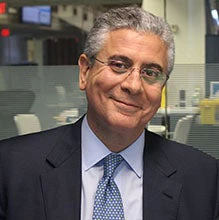 Children in Sharm El-Sheikh, Egypt. (Shutterstock.com/OlegD)
Children in Sharm El-Sheikh, Egypt. (Shutterstock.com/OlegD)
As we commemorate the International Day of Education this month, the 2023 theme “to invest in people, prioritize education” – it is all the more crucial for the countries of the Middle East and North Africa that over the past decade, have gone through social, economic, and political tectonic shifts, which resulted in a dramatic deficit in their human capital performance and most notably in the education sector, to move and tackle this matter of significant impact on their generational development.
Learning — from basic literary and numeracy, to foundational skills and critical thinking — is essential. Yet, due to the impact of school closures during the COVID-19 pandemic, millions of children across our region are falling further behind.
To be candid and not skirt the real structural issues of the education sector in MENA, we know that even before COVID-19, the rate of learning poverty — which is the share of children unable to read and understand a basic text by the age of 10 — stood at a shocking and unacceptable 60% in MENA. Now due to school closures, the region’s rate of learning poverty is expected to increase by at least another 10%.
From 2020 to 2022, schools in MENA closed for an average of 22 weeks, equivalent to half a school year. Despite attempts with remote schooling, recent data shows students on average made none of the usual learning gains . So every month out of school, meant a month of learning losses.
The short-term consequences are dire, and the long-term costs staggering. Learning is an essential building block of human capital, which is at the foundation of sustainable economic development. Our research projects that these learning setbacks — if not remedied — could cost today’s students in the region 10% of their future annual earnings, or a combined $800 billion in lost earnings over their lifetime.
Learning losses add yet another dimension to the multiple crises facing the region today. Rampant inflation, high debt burdens, and climate change demand immediate responses, placing heavy strains on countries with already limited fiscal space. This has caused knock-on effects on education spending, which is dipping below 2019 levels in low- and middle-income countries.
MENA is a disparate region, in which some countries, riding on a windfall of resources, are allocating important funding for education. Others, due to a number of factors including unrest and instability, are lagging far behind, resulting in a regional average of education spending is 3.8% of GDP, which is under the global average of 4.5%. In the midst of managing immediate crises, governments must still maintain focus on the longer-term development goals that build resilience and prosperity. Making strong and smart investments in education and allocating resources in an efficient way, is one of the best ways to deliver on the promise of a better future.
Improving learning outcomes requires multi-faceted policy and investment approaches: keep schools open, both in-person or virtually, as needed and possible; increase the hours of instruction; match instruction to students’ learning levels; focus on literacy, numeracy, and core learning skills; ensure every teacher is well-prepared, motivated, present, and compensated on a timely basis and promote the role and value the social status of the teacher, including through public awareness campaigns. This can be done, even in countries wracked by conflict such as Lebanon, Syria, and Yemen.
While not getting into the thorny issue of the variations of language around the region, we need to recognize that Modern Standard Arabic is the main vehicle of knowledge – in addition to and combined with the absolute need to build on foreign language training all the way to proficiency.
Countries in the MENA region are taking action, with promising results:
-
In Morocco, learning recovery has been placed at the center of education reforms. The government piloted a learning recovery program adapted from the Teaching at the Right Level approach , and evaluations revealed substantial improvements by the participating students in all three core subjects: Arabic, Mathematics, and French.
-
Jordan, Saudi Arabia, and the UAE have prepared specific strategies for improving Arabic literacy in the early grades with ambitious learning targets and action plans.
-
MENA countries are increasingly participating in international student assessments, such as PISA (Program for International Student Assessment) and TIMSS (Trends in International Mathematics and Science Study). In 2022, Egypt undertook its first national Grade 4 assessment of Arabic literacy and Mathematics. Measuring is essential to be able to target interventions in the areas most needed. Publicly sharing assessment results builds awareness and helps mobilize action across a wide realm of vested stakeholders.
-
Enrollment in pre-schools, where early literacy skills develop, is also crucial. The World Bank is supporting the expansion of quality pre-school program s across the region. For example, in the Palestinian territories, 237 classrooms were rehabilitated last year, and the government has just launched 7 public-private partnerships for early childhood education.
-
Providing cash transfers to families with school-age children, targeting extra support to the most vulnerable, helps those students at highest risk of dropping out. Health, nutrition, and shelter are also fundamental prerequisites for learning, and the World Bank is supporting governments across the MENA region with cash transfer programs that provide an essential lifeline for families in greatest need.
By taking concerted action, underpinned by strong and smart investments, countries have the chance to recover the learning losses. As the largest external financier of education in the world, the World Bank is a committed partner to MENA countries on education.
With all stakeholders working together — governments, families, educators, development partners, civil society, and the private sector — MENA can create the change needed to transform learning outcomes, and in doing so, deliver on the promise of a brighter future for this generation. The time to act is now!


Join the Conversation